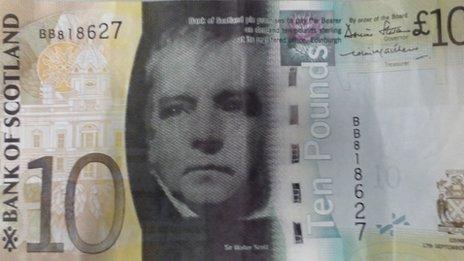Bank of Scotland unveils new £10 plastic note design
- Published

The front of the new polymer note will continue to feature Sir Walter Scott
Bank of Scotland has unveiled the design of its new £10 polymer note, which is due to enter circulation in the autumn.
The front of the note will continue to feature Scottish novelist and poet Sir Walter Scott alongside The Mound in Edinburgh.
The Glenfinnan Viaduct will remain on the reverse of the design.
However, it will now feature a steam locomotive hauling a heritage tourist train.
The locomotive is a Stanier "Black 5", which was designed for London, Midland and Scottish Railway and often seen on the West Highland line.

The reverse side of the new design features a steam locomotive hauling a heritage tourist train
The new note, which was designed by banknote manufacturer De La Rue, is slightly smaller than the existing paper version in circulation.
It includes security features incorporated in the bank's new polymer £5 note, which entered circulation in October.
They include an anti-counterfeit "window effect", built into the windows of the image of The Mound, and metallic ink which changes colour as the note is moved.
There is also a new "tactile emboss", created by a series of raised dots, which is designed to aid the visually impaired.

The existing Bank of Scotland £10 note features the Glenfinnan Viaduct without a train
All existing paper Bank of Scotland £10 notes will be gradually withdrawn following the issue of the new note.
However, they will continue to be accepted at shops, banks and cash payment machines.
Mike Moran, director at Bank of Scotland, said: "Bank of Scotland has been issuing bank notes for more than 320 years, evolving our designs to pay homage to our heritage.
"The new note retains our much loved design of Sir Walter Scott with the famous Glenfinnan Viaduct pictured on the back and we've evolved the design by introducing the popular heritage tourist train crossing the bridge.
"With polymer notes being cleaner, more secure, and more durable than paper notes, I'm sure our new £10 note will prove popular across Scotland."
- Published4 October 2016

- Published1 June 2015

- Published23 March 2015
